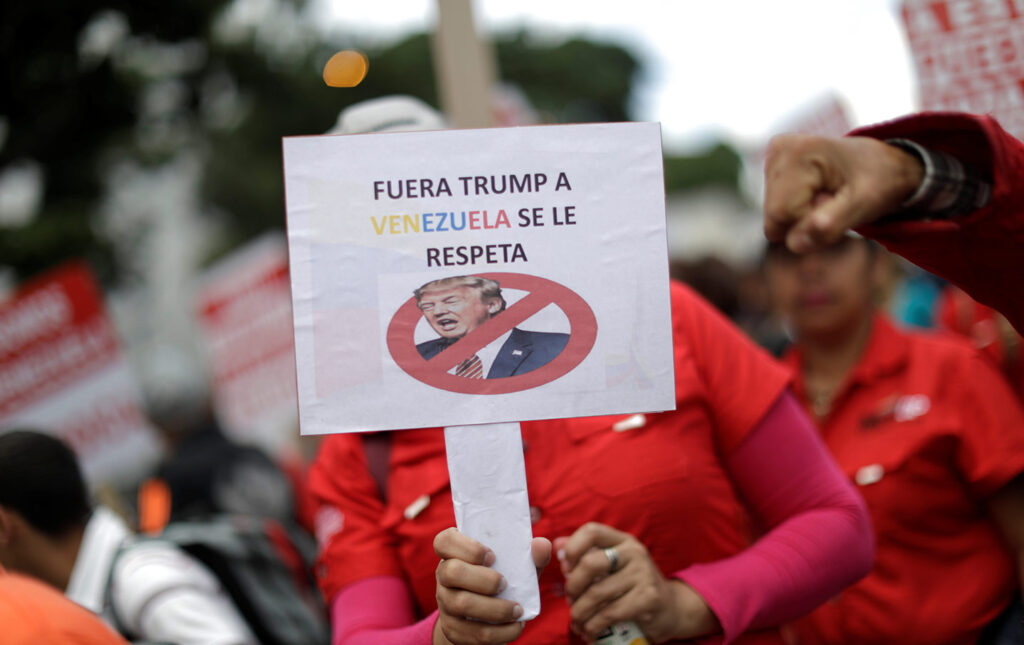By Tim Young. Venezuela Solidarity Campaign
Venezuela’s efforts to protect its population from the COVID-19 pandemic are being jeopardised by Trump’s aggressive tactics towards the country.
Trump’s strengthening of illegal US sanctions against Venezuela since 2017 – creating an economic blockade of the type employed against Cuba since the 1960s – have weakened its health infrastructure by cutting deeply into its oil revenues and its capacity to import key medical supplies and equipment.
Venezuela’s healthcare system has been under increasing strain, especially in its border regions with the influx of over 70,000 migrants returning across the Colombian and Brazilian borders. By mid-August Colombia had recorded 410,453 cases while in Brazil the outbreak is out of control with over 3 million cases.
To help deal with the pandemic, Venezuela has received over 1,000 tonnes of medical supplies, both as donations and as part of trade deals, from Cuba, China, Russia, and Iran, as well as from the United Nations and the World Health Organization. A shipment of over 25 tonnes of aid also arrived from Turkey, including 25 ventilators, 40,000 PCR tests, 10,000 facemasks, and 35,000 protective suits.
Inevitably, the cumulative effects of the sanctions are affecting Venezuela’s capacity to deal with the pandemic, but unlike Bolsonaro in Brazil the government took swift action to contain its spread.
Decreeing a health emergency, the government prohibited crowds from gathering, cancelled flights from Europe and Colombia and instituted a nationwide lockdown. An online survey about possible symptoms completed by 13 million people identified the need for almost 35,000 door-to-door medical visits.
A raft of other measures prioritising health and wellbeing have also been put in place.
To date (mid-August), Venezuela has reported 27,938 cases and 238 deaths, compared for example to neighbouring Colombia’s 13,475 deaths or Brazil’s 103,099 deaths.
The Venezuelan government also asked the International Monetary Fund (IMF) for a US$5 million emergency loan. But the IMF refused to consider Venezuela’s request on the grounds “there is no clarity on recognition” of who the official government is amongst its 189 member states.
In fact, only just over a third of the IMF membership recognise Juan Guaidó, the failed coup leader and self-proclaimed ‘interim president’, while the UN continues to recognise Nicolas Maduro as the elected leader of the country.
The IMF’s refusal has attracted widespread criticism for putting ideology above the welfare of an entire people and accepting more deaths in Venezuela rather than take a humanitarian position and offend the US, a major funder of the organisation.
The European Union’s Foreign Ministers supported Venezuela’s application to the IMF for financial aid, and a wide spectrum of countries, organisations and prominent figures across the world – including the Pope, the EU, the UN General Secretary and many others – have called for US sanctions to be suspended immediately, to be replaced by constructive dialogue and aid.
In advocating the lifting of sanctions, UN Secretary General Antonio Guterres said: “This is the time for solidarity not exclusion.”
For Britain’s part, the High Court placed a further obstacle to Venezuela combatting the COVID-19 pandemic through its ruling in July blocking the return by the Bank of England of 31 tons of the country’s gold worth an estimated US$1.2 billion. The court ruled that the UK government’s recognition of Juan Guaidó as Head of State invalidated the request to return the funds by the Central Bank of Venezuela and the Venezuelan government.
The government planned to sell the gold reserves and transfer the proceeds to the United Nations Development Programme in order to import food, medicines and healthcare equipment. It is appealing against the High Court decision.
- Sign the petition against Trump’s sanctions at https://bit.ly/stopvenezuelasanctions

